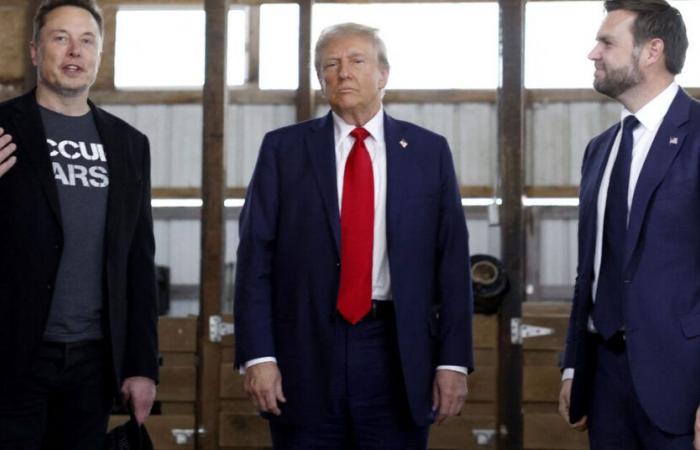Is the re-election of Donald Trump a threat to democracy? Hans Ulrich Gumbrechtprofessor emeritus of literature at Stanford (United States), tempers these fears. However, he observes with concern a new generation of conservatives with radical – and anti-democratic – ideas establishing themselves in the president’s entourage. We questioned him.
How do you explain Donald Trump’s victory?
Hans Ulrich Gumbrecht: My analysis is that Donald Trump has a much better understanding of how to deal with many Americans’ sense of political powerlessness. The central element of parliamentary democracy is representation. In recent years and decades, however, our communication has changed massively due to the fact that we communicate primarily electronically. I still remember very well my first visiting professorship in the United States, where you had to agree on everything well in advance, otherwise you missed out. Today it’s different. We are constantly networked. We constantly feel like we can send and receive very easily. On the other hand, the structure of political representation has become incredibly complicated at the same time. No one today imagines being able to exercise real influence over the parliamentarian they have elected. We certainly determine who sits in the House of Representatives, but the idea that we could one day have a conversation with him, and therefore political influence, has vanished. Trump gives the impression that with him, there will not be this gap between hypercommunication and the feeling of political powerlessness. He works in the fryer at McDonald’s, drives a garbage truck and seeks to communicate directly with people. “Look, my direct communication with you, I transform it into direct political representation for you. » He wants to show that he knows that classic democratic structures, in their complexity, bring nothing to “real Americans”.
Was Kamala Harris’ campaign the opposite?
The difference is not so clear. Both candidates relied on what I would call “communication by resonance”. They didn’t really talk about content, but focused on sympathy. Neither Harris nor Trump said exactly what their agenda was. If you put what little they said side by side, it’s surprisingly similar. So it was a duel between two types of “likability” and, as an American citizen, I understand very well why the majority chose Trump: Harris failed to dispel her image as an out-of-touch intellectual. Especially since this is a person who also worked as a prosecutor and therefore belonged to a professional group that many people are afraid of. She was precisely not easily accessiblewhich, as stupid as it sounds, could have played an important role.
“No one today imagines being able to exercise real influence over the parliamentarian they have elected. Trump gives the impression that with him, there will not be this gap between hypercommunication and the feeling of political impotence”
Didn’t Trump, however, have a program, very different from that of Harris?
Of course, he initiated the writing of “Project 2025”, which contains a sort of agenda. But from the voter’s point of view, its content was not decisive. On the other hand, the idea that Trump knows exactly what Project 2025 includes, and that he intends to stick to it precisely, is inadequate. I think we should treat this mass deportation agenda the same way as Trump’s wall talk during his first term, only a fraction of which has been implemented. Trump’s main concern is not with content. He just wants to sit in the White House and wear his trademark white bathrobe. DT !
Where many expect a second term which will have disastrous consequences on their lives, are you rather reassuring?
I think the next four years will not be as bad as many fear. State government is far more important to the lives of most Americans than who is president at any given time. Let me add this: I see where the irritation comes from for many people who wonder how a billionaire can present himself as a friend of the little people. Here’s my answer: it doesn’t matter, he comes across as a nice guy and manages to give the image of a real “boss”. He regularly emphasizes this: “My advisors advised me Xbut I do Y. » He thus touches the feeling of many Americans exasperated by intellectuals, elites, pretentious Ivy League graduates who want to tell them what to do when they feel like they would do better by listening to their instincts.
“I think the next four years will not be as bad as many fear. The government of the different states is more important than the question of who is president at any given time”
Did voters also speak out against a candidate who represents parliamentary democracy?
Harris played the game of parliamentary democracy to the fullest, as vice-president. But this is precisely what is not attractive about his candidacy – a harsh observation. The question many are asking today is: what happens if a government that wants to abolish democracy comes to power through democratic means? Should we find mechanisms to exclude this possibility from the outset? Or should we say: of course, if the majority of people do not want democracy, democracy must be democratically abolished? You see the paradox. But that’s a bit of the situation, although here too, unlike many others, I would be more reassuring. The election went so well for Trump that the democratic procedures actually give him a legitimacy bonus. Contrary to all the polls, the election was not close at all. Democracy in the United States is not threatened in the short and medium term.
And in the long term?
We can formulate the worst-case scenario in the form of a question: parliamentary democracy, which was born at the end of the 18the century as the main consequence of the Enlightenment, which strengthened throughout the 19th centurye century and which experienced a global triumphal march in the 20the century, especially after the Second World War, has it arrived in the 21ste century to a point where it no longer functions due to demographic, economic and media conditions? Putting it that way might make you think I’m for Trump, which I’m definitely not. But I firmly believe that we must ask this question, because otherwise we will act as if parliamentary democracy as a form of government is outside of history, which it is not. In my opinion, she is not directly threatened by Trump. I think we should, however, pay much more attention to his immediate entourage and their plans for the future of this country.
“Paradox: if the majority does not want democracy, should democracy be democratically abolished? […] I think that democracy in the United States is not threatened in the short and medium term, but Trump is preparing the ground for those around him”
What plans are you thinking of?
I know well Peter Thielwho invested very early in Facebook and is very influential in Silicon Valley. He truly “invented” J.D. Vancethe young [il a 40 ans] Donald Trump’s running mate. Trump is 78 years old. The future that we must therefore extrapolate from election day, to clearly understand where we are going, is JD Vance. I invited Thiel in March for my conference “The Crisis of Representation”. He is a very good speaker, very well read, you have to admit, even if he says a lot of things that don’t suit you. On this occasion, he told me why he had not given Trump a dollar in this campaign: « Not enough discontinuity » (“Not enough discontinuity”, “Not enough will for change”). What bothers him, in my opinion, is his lack of program. When I asked him what real change would be the state in whichhe told me he didn’t know. However, we can think of abolishing the electoral system in order to be able to impose real changes over longer government periods. Or a fundamentally different military structure, with an independent army. This, I think, is the direction people like Thiel are taking right now.
“Trump touches the feelings of many Americans who are exasperated by intellectuals, elites, pretentious Ivy League graduates who want to tell them what to do when they feel like they are better off by listening to their instincts”
So it’s the post-Trump era that worries you?
The idea of this next generation, with Vance as leader, worries me a lot, indeed. He is very different from Trump. He comes from a very poor family in Ohio and is extremely intelligent. There is almost nothing populist about him, he has a strong political career and a significant biographical trajectory, with his conversion to Catholicism. Vance alone could not have won the election, something he and Thiel knew. But for the future, we must consider Vance as an “agent of discontinuity” (« driver of the big break »). The plan could be summarized as follows: no taxes, no experts, no elections. This is what has been interesting about this election – the possibility of a very different society whose horizon is now more “realistic”. This is not what will happen with Trump over the next four years, but what could happen next with his entourage, who has very radical ideas and is considering a completely different social project. Trump sets the stage for those around him.
Are you also thinking of Elon Musk?
Of course. Musk did not position himself politically for a very long time, and for good reasons. But the thing about him is that he’s very smart and he saw that Trump could serve as a catalyst for his long-term plans. Now Vance, Thiel and Musk have four years to think about what this fundamentally different society should look like; to ask themselves if they really want a new election, who might be the right candidate, etc. From their point of view, it is an advantage that Trump does not put the content of a program in their way (since he does not have one). For the people who finance him, Trump was only chosen to provide a “filler” role.
Originally published in the German edition of our magazine, the original version of this interview can be viewed here.






